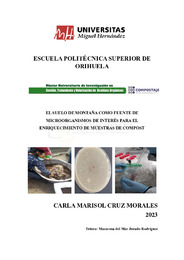Por favor, use este identificador para citar o enlazar este ítem:
https://hdl.handle.net/11000/29924Registro completo de metadatos
| Campo DC | Valor | Lengua/Idioma |
|---|---|---|
| dc.contributor.advisor | Jurado Rodríguez, Macarena del Mar | - |
| dc.contributor.author | Cruz Morales, Carla Marisol | - |
| dc.contributor.other | Departamentos de la UMH::Agroquímica y Medio Ambiente | es_ES |
| dc.date.accessioned | 2023-10-31T10:29:13Z | - |
| dc.date.available | 2023-10-31T10:29:13Z | - |
| dc.date.created | 2023-09 | - |
| dc.identifier.uri | https://hdl.handle.net/11000/29924 | - |
| dc.description.abstract | La bioaumentación, consistente en la inoculación con microorganismos especializados, con objeto de mejorar el compostaje, optimizando la transformación del material durante el proceso, y el compost finalmente obtenido, incrementando sus funcionalidades. Para ello, la microbiota asociada a los suelos naturales, con poca afectación antropogénica como los situados en zonas de montaña, se postula como una interesante opción para su empleo como inoculantes, especialmente para la mejora del potencial biofertilizante, biopesticida y fitoestimulante del compost, convirtiéndolo en una alternativa factible frente al uso de fertilizantes y pesticidas químicos tradicionales. En el presente trabajo, se recopiló información sobre el conocimiento científico actual del microbioma de suelos de montaña, que variaran en función de diversos factores como las condiciones climáticas, el tipo de vegetación, los valores de pH del suelo o la presencia de animales, lo que ha demuestra que se trata de una fuente interesante de recursos aún poco explotada, lo cual sienta las bases para el desarrollo de herramientas microbiológicas basadas en el empleo de microorganismos beneficiosos para su posterior uso | es_ES |
| dc.description.abstract | Bioaugmentation, consisting of inoculation with specialized microorganisms, in order to improve composting, optimizing the transformation of the material during the process, and the compost finally obtained, increasing its functionalities. To this end, the microbiota associated with natural soils, with little anthropogenic impact such as those located in mountain areas, is postulated as an interesting option for use as inoculants, especially for improving the biofertilizer, biopesticide and phytostimulant potential of compost, converting it in a feasible alternative to the use of traditional chemical fertilizers and pesticides. In the present work, information was collected on the current scientific knowledge of the microbiome of mountain soils, which will vary depending on various factors such as climatic conditions, type of vegetation, soil pH values or the presence of animals, which which has shown that it is an interesting source of resources that is still little exploited, which lays the foundations for the development of microbiological tools based on the use of beneficial microorganisms for subsequent use | es_ES |
| dc.format | application/pdf | es_ES |
| dc.format.extent | 67 | es_ES |
| dc.language.iso | spa | es_ES |
| dc.publisher | Universidad Miguel Hernández de Elche | es_ES |
| dc.rights | info:eu-repo/semantics/openAccess | es_ES |
| dc.rights.uri | http://creativecommons.org/licenses/by-nc-nd/4.0/ | * |
| dc.subject | Compostaje | es_ES |
| dc.subject | Microorganismos | es_ES |
| dc.subject | Suelos de montaña | es_ES |
| dc.subject | Bioaumentación | es_ES |
| dc.subject.other | CDU::6 - Ciencias aplicadas::63 - Agricultura. Silvicultura. Zootecnia. Caza. Pesca::631 - Agricultura. Agronomía. Maquinaria agrícola. Suelos. Edafología agrícola | es_ES |
| dc.title | El suelo de montaña como fuente de microorganismos de interés para el enriquecimiento de muestras de compost | es_ES |
| dc.type | info:eu-repo/semantics/masterThesis | es_ES |

Ver/Abrir:
TFM Cruz Morales, Carla Marisol.pdf
1,06 MB
Adobe PDF
Compartir:
 La licencia se describe como: Atribución-NonComercial-NoDerivada 4.0 Internacional.
La licencia se describe como: Atribución-NonComercial-NoDerivada 4.0 Internacional.
.png)